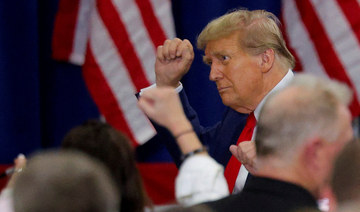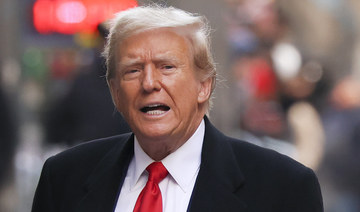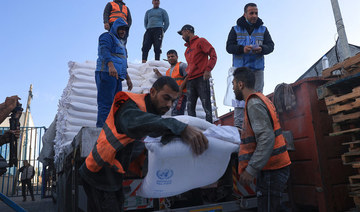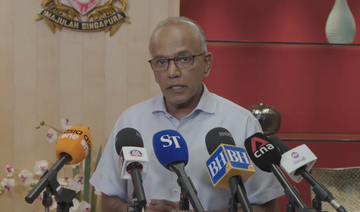ATLANTA: Donald Trump on Wednesday lashed out at Jewish voters who back President Joe Biden and framed this year’s election as a referendum on the strength of Christianity in the US, part of his sharp-edged continuing appeal to evangelical conservatives who are a critical element of his political base.
Speaking in Atlanta ahead of a fundraiser, the presumptive Republican nominee renewed his running criticism of Biden’s reaction to the Israel-Hamas war and the administration’s support for the rights of LGBTQ Americans, including transgender persons.
“Biden has totally lost control of the Israel situation,” said Trump, whose rise in 2016 depended heavily on white Christian conservatives. “Any Jewish person who votes for a Democrat or votes for Biden should have their head examined.”
Trump spoke after Biden last week warned Israeli Prime Minister Benjamin Netanyahu that future US support for Israel’s Gaza war depends on the swift implementation of new steps to protect civilians and aid workers.
In Trump’s interpretation, Biden “has totally abandoned Israel.”
The Gaza conflict has sandwiched Biden between conservatives – both Christian and Jewish – who want stalwart support for Netanyahu’s government, and progressives. The matter is important to conservative Christians, among Trump’s most supportive constituencies, who see the political state of Israel as the modern manifestation of God’s chosen people, the Israelites of the Old Testament in the Christian Bible.
Biden’s left flank, though, is dominated by progressives incensed by Israel’s retaliation in Gaza that has resulted in thousands of Palestinian deaths. The president has repeatedly been greeted by protesters throughout his spring travels, and activists have organized votes against Biden in many Democratic primaries, even as he coasts to renomination.
The president’s campaign pushed back on Wednesday.
“Jewish Americans do not need to be ‘spoken to’ or threatened by Donald Trump,” said Biden spokesman James Singer. “This is what Trump does, using division and hate as political weapons while seeking power for himself. Voters of all stripes will reject his chaos, violence and unhinged threats once again in November.”
In Georgia, Trump stoked his Christian base anew by putting the Election Day stakes in religious terms.
“November 5th is the most important day in the history our country, and it’s going to be Christian Visibility Day,” Trump said, repeating for emphasis: “Christian Visibility Day.”
Christians, he predicted “are going to come out, and they’re going to vote like never before.”
The former president was nodding to conservative Christian anger over the International Transgender Day of Visibility, a worldwide celebration of transgender persons and acknowledgement of their struggles, and Biden’s recognition of the occasion.
The observance traces its origins to 2009 but it has grown in prominence, and this year coincided with Easter Sunday, the holiest day of the Christian calendar. When Biden, a Catholic, issued a March 29 proclamation declaring the same Sunday to be the official Transgender Day of Visibility in the United States, conservatives reacted with a social media firestorm, with some commenters even suggesting Biden and his aides deliberately set the date to insult Christians.
“Today, we send a message to all transgender Americans: You are loved. You are heard. You are understood. You belong,” Biden said in the proclamation. “You are America, and my entire administration and I have your back.”
Most of the president’s critics ignored the fact that he separately issued a statement on Easter itself, specifically reflecting his own faith.
“Easter reminds us of the power of hope and the promise of Christ’s Resurrection,” Biden said. “As we gather with loved ones, we remember Jesus’ sacrifice. We pray for one another and cherish the blessing of the dawn of new possibilities. And with wars and conflict taking a toll on innocent lives around the world, we renew our commitment to work for peace, security, and dignity for all people.
“From our family to yours,” Biden concluded, “happy Easter and may God bless you.”
Notably, Trump on Wednesday also emphasized his stance on abortion, insisting that the matter should be left to state governments and that, even there, Republicans should not pursue absolute bans — an overall approach that puts the former president to the left of the most outspoken activists on the Christian right. On that matter, however, Trump did not invoke religious doctrines and loyalties.
Trump assails Jewish voters who back Biden: ‘Should have their head examined’
https://arab.news/vvve9
Trump assails Jewish voters who back Biden: ‘Should have their head examined’
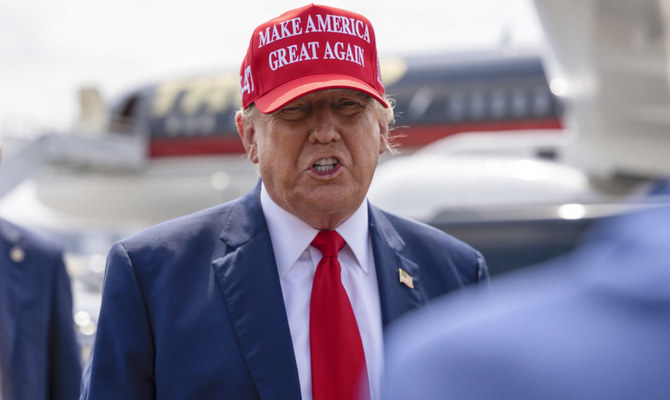
- The Gaza conflict has sandwiched Biden between conservatives – both Christian and Jewish – who want stalwart support for Netanyahu’s government, and progressives
Slovakia PM Fico’s fate remains in balance after surgery, deputy PM says

“Unfortunately, I cannot say yet that we are winning (the battle to save Fico) or that the prognosis is positive,” Deputy Prime Minister Robert Kalinak said
BRATISLAVA/BANSKA BYSTRICA, Slovakia, May 16 : Slovakia’s Prime Minister Robert Fico remains in a serious condition and it is too soon to say whether he will recover, a deputy prime minister said on Thursday, a day after an assassination attempt that has sent shock waves across Europe.
The shooting was the first major assassination attempt on a European political leader for more than 20 years, and has drawn international condemnation. Political analysts and lawmakers say it has exposed an increasingly febrile and polarized political climate both in Slovakia and across Europe.
“Unfortunately, I cannot say yet that we are winning (the battle to save Fico) or that the prognosis is positive because the extent of the injuries caused by four gunshot wounds is so extensive that the body’s response will still be very difficult,” Deputy Prime Minister Robert Kalinak said.
Interior Minister Matus Sutaj Estok, speaking at the same news conference, said the shooter — whom police have charged with attempted murder — had acted alone and had previously taken part in anti-government protests.
“This is a lone wolf who had radicalized himself in the latest period after the presidential election (in April),” Sutaj Estok said.
The suspect listed government policies on Ukraine and its plans to reform the country’s public broadcaster and dismantle the special prosecutor’s office as reasons for the attack, the interior minister added.
Miriam Lapunikova, director of the F.D. Roosevelt University Hospital in Banska Bystrica where Fico is being treated, said the 59-year-old prime minister had undergone five hours of surgery with two teams to treat multiple gunshot wounds.
“At this point his condition is stabilized but is truly very serious, he will be in the intensive care unit,” she told reporters.
Slovak President Zuzana Caputova called for a calming of political tensions. Fico ally and President-elect Peter Pellegrini urged parties to suspend or tone down their campaigning for next month’s European Parliament elections.
“If there is anything the people of Slovakia urgently need today, it is at least a basic consensus and unity among Slovaks’ political representatives,” said Pellegrini, who won an April election for the mainly ceremonial post of president.
VETERAN LEADER
Fico has dominated Slovak politics for much of the past two decades, winning re-election last October for a fourth stint as premier.
He has fused left-leaning economic views with nationalism, tapping into widespread discontent over living standards, but has also proved a divisive figure. His critics say new reforms threaten the rule of law and media freedoms in Slovakia, a member state of the European Union and NATO.
Fico’s calls for ending sanctions on Russia and halting arms supplies to Ukraine have endeared him to Moscow, and President Vladimir Putin and other Russian politicians have been prominent among those condemning Wednesday’s assassination attempt.
Fico was shot while greeting supporters in the street after chairing a government meeting in the central town of Handlova.
Slovak news media reported that the 71-year-old gunman was a former security guard at a shopping mall, the author of three collections of poetry and a member of the Slovak Society of Writers. News outlet Aktuality.sk cited the suspect’s son as saying his father was the legal holder of a gun license.
There has been no official confirmation of the gunman’s identity and background.
The incident raised questions over Fico’s security arrangements, as the attacker managed to fire five shots at point blank range despite the prime minister being accompanied by several bodyguards.
In an undated video posted on Facebook, the alleged attacker was seen saying: “I do not agree with government policy” and criticizing government plans to revamp the public broadcaster.
Reuters verified the person in the video matched images of the man arrested after Fico’s shooting.
Fico and his government coalition allies have criticized sections of the media and the opposition, saying they had inflamed tensions in the central European state.
Slovakia’s biggest opposition party, the liberal, pro-Western Progressive Slovakia, was quick to condemn the shooting and called off a protest rally planned for Wednesday evening. It has also urged all politicians to avoid stoking tensions.
Russian tycoon Deripaska calls latest US sanctions ‘balderdash’

- “I strongly believe that we need to do everything we can to establish peace, not serve the interests of warmongers,” Deripaska said
- Since Russia’s invasion of Ukraine, Deripaska has been sanctioned by Britain for his alleged ties to Putin
FRANKFURT: Russian tycoon Oleg Deripaska dismissed the latest US sanctions on a series of companies that the US Treasury said were connected to a scheme to evade sanctions and unlock frozen shares as nonsense.
“This balderdash isn’t worth the time,” Deripaska said by message via a spokesperson in response a Reuters request for comment about the latest US sanctions.
“While the horrific war in Europe claims hundreds of thousands of lives every year, politicians continue to engage in their dirty games. I strongly believe that we need to do everything we can to establish peace, not serve the interests of warmongers,” he said.
The US Treasury on Tuesday announced it had sanctioned a web of Russian companies it said were being used to disguise ownership of a $1.6 billion industrial stake controlled by Deripaska.
Austria’s Raiffeisen Bank International was planning to buy the stake and dropped the transaction following mounting US pressure to abort the bid.
In its sanctions announcement, the US Treasury alleged it was an “attempted sanctions evasion scheme” to unfreeze a stake using “an opaque and complex supposed divestment.”
Since Russia’s invasion of Ukraine, Deripaska has been sanctioned by Britain for his alleged ties to Putin. He has mounted a legal challenge against the sanctions which he says are based on false information and ride roughshod over the basic principles of law and justice.
Deripaska, who made his fortune by buying up stakes in aluminum factories has also been subjected to sanctions by the United States, which in 2018 took measures against him and other influential Russians.
Those sanctions were “groundless, ridiculous and absurd,” Deripaska has previously said.
Outrage grows in India after Israel kills Indian army veteran

- Col. Waibhav Anil Kale was working for the UN Department of Safety and Security
- More than 190 UN staff killed since the beginning of Israel’s onslaught on Gaza
NEW DELHI: The killing of an Indian army veteran serving as a UN staffer in Gaza has stirred outrage in India and prompted calls for the government to hold Israel accountable.
Col. Waibhav Anil Kale was on duty with the UN Department of Safety and Security when his UN-marked vehicle was targeted in southern Gaza on Monday.
A former peacekeeper, he was hit on the way to the European Hospital in Rafah by what the UN said it had no doubt was Israeli tank fire.
The Indian Ministry of External Affairs issued a statement on Wednesday in response, saying it was “deeply saddened by the death” and that it was “in touch with relevant authorities” regarding an investigation into the incident.
The statement did not contain condemnation, unlike in July 2022, when two Indian peacekeepers were killed in an attack on a UN Organization Stabilization Mission base in the Democratic Republic of the Congo.
At that time, India’s foreign minister said the perpetrators “must be held accountable and brought to justice” and convened a special meeting of the UN Security Council to discuss the attack.
Talmiz Ahmad, former Indian ambassador to Saudi Arabia, told Arab News on Thursday that the government’s response was “grossly inadequate” given it was a “calculated killing” of an Indian army officer and UN staffer.
“The Indian government can hold Israel accountable. India is a sponsor of a resolution related to the protection of the UN personnel,” he said.
“This particular killing of a UN officer is a targeted killing because it was very obvious to Israelis that this was a UN vehicle, and it was on an official UN mission. A tank deliberately targeted this vehicle.”
New Delhi has always been sensitive to assaults on UN personnel given that it is one of the largest contributors of the organization’s peacekeepers.
The reaction to Kale’s killing was insufficient, according to Kavita Krishnan, a women’s rights activist.
“If a person is a UN employee, he is entitled to protection,” she said.
“The Indian government should specifically hold Israel accountable for this killing. They cannot treat it just as a casualty of war or collateral damage.”
Israel’s deadly siege and bombardment of Gaza has since October killed over 35,000 people, wounded 70,000, and left most of the enclave’s population starving and with no access to medical, food and water supplies.
The UN estimates that more than 190 of its staff members have also been killed in the ongoing onslaught. Kale was the first international UN employee to be killed.
“It’s condemnable that India does not name the fact of assassination. It’s not death. He did not die of illness. He was killed by Israel,” said Apoorvanand Jha, a public intellectual and professor at the University of Delhi.
“Israel kills people who are involved in the health services … kills journalists, aid workers and kills workers involved in the peacekeeping forces. So, it does it knowingly. It is not a collateral damage. Israel does it knowingly — this is what has been recorded many times. Israel needs to be held accountable for all the individual crimes of assassinations and the collective crimes, mass deaths.”
The killing of UN personnel goes against international humanitarian law.
“New Delhi should tell Tel Aviv that it should respect international law,” said Anwar Sadat, senior assistant professor at the Indian Society of International Law.
“The Indian government should issue a diplomatic demarche to the Israeli government.”
The government’s reaction was also seen as not boding well for the safety of Indian workers whom New Delhi has agreed to send to Israel.
Since the beginning of its invasion of Gaza, Israel has revoked work permits for tens of thousands of Palestinian laborers and sought to facilitate their replacement with manpower from South Asia.
In November, the Indian government signed a three-year agreement with Tel Aviv on the “temporary employment” of workers in the construction and caregiving sector.
“If this is the statement that the Indian government can bring for an official who works with the UN, imagine what if it happens with any of the workers. No one is going to speak,” said N. Sai Balaji, assistant professor at Jawaharlal Nehru University.
“This seriously compromises India’s super-power ambitions; it seriously compromises India’s own foreign policy.”
Mosque attack in Nigeria leaves 8 people dead, as police say the motive was a family dispute

- Four children were among the injured worshippers
- The incident caused panic in Kano, northern Nigeria’s largest state, where periodic religion-related unrest has occurred over the years
ABUJA: At least eight worshippers were killed and 16 others injured early Wednesday morning after a man attacked a mosque with a locally made explosive in northern Nigeria’s Kano state, resulting in a fire outbreak, the police said.
The suspect, a 38-year-old local resident, confessed that he attacked the mosque in Kano’s remote Gadan village “purely in hostility following (a) prolonged family disagreement,” police spokesman Abdullahi Haruna said in a statement on Wednesday.
Eight of those injured died later in a hospital, Haruna later told local Channels Television on Thursday. Four children were among the injured worshippers, although it was not clear if any of the children died.
The incident caused panic in Kano, northern Nigeria’s largest state, where periodic religion-related unrest has occurred over the years, sometimes resulting in violence.
The suspect invaded the mosque with “a locally prepared bomb and exploded it,” local police chief Umar Sanda told reporters. “It has nothing to do with terrorism.”
Footage broadcast by the local TVC station showed charred walls and burned furniture in the mosque, the main place of worship for Gadan village in Muslim-dominated Kano state.
Local media also reported the worshippers were locked inside the mosque, making it difficult for them to escape.
“Some children ran for their lives with fire all over them. We had to put water to quench it,” Hussaini Adamu, a resident, told TVC.
The police cordoned off the scene while the injured were rushed to a hospital in the state capital.
“The disagreement (was) over sharing of inheritance of which those that (the attacker) alleged to have cheated on him were in the mosque at that moment and he did that for his voice to be heard,” the police statement said.
What to expect as new, guitar-playing PM takes helm in Singapore

- Lawrence Wong went viral for his guitar cover of Taylor Swift’s ‘Love Story’ in March
- Best chapters of our Singapore story lie ahead, new PM said in inaugural speech
SINGAPORE: As Singapore gets a new prime minister for the first time in 20 years, experts have told Arab News what to expect from the city-state’s fourth leader, Lawrence Wong, who came to the fore with his handling of the successful COVID-19 response.
Wong was inaugurated on Wednesday evening, taking over the reins from Lee Hsien Loong, son of the founding father of modern Singapore Lee Kuan Yew.
The 51-year-old began his career as an economist at the trade ministry with a US educational background, before moving up to occupy some of the biggest jobs in Singapore’s bureaucracy, including the Energy Market Authority and Lee’s principal private secretary.
The civil servant-turned-politician was catapulted into the spotlight in 2020, when he coordinated Singapore’s successful fight against COVID-19. He has also garnered public support by showcasing his guitar skills online, including a cover of Taylor Swift’s “Love Story” that went viral in March.
“Lawrence Wong has been in charge with the COVID-19 pandemic, and he did very well. Singapore did very well by and large; that was something that the international community noticed,” said James M. Dorsey, a senior fellow at the Nanyang Technological University.
Compared with Lee, Wong will still have to work on his global exposure, but should be able to capitalize on the enduring image of Singapore’s “serious stability,” Dorsey added.
“As we watch the process of build-up toward the transition, we will have greater confidence in Lawrence Wong. And simply the confidence in the way Singapore does things, working in Wong’s favor.”
Southeast Asia analyst Adib Zalkapli is expecting Wong to continue the policies of his predecessor, who oversaw the country’s economic growth into an international financial hub and top tourist destination, more than doubling the island’s gross domestic product per capita.
“It’s a well-planned change of leadership that will ensure continuity. We are unlikely to see major policy changes in the short to medium term,” he told Arab News, adding that the same approach will likely apply on matters related to foreign policy.
Bridget Welsh, an honorary research associate at the Asia Research Institute in the University of Nottingham Malaysia, is also expecting continuity.
“Essentially status quo. Arguably, there will be more engagement, as issues remain complex in the region, and the new leadership will want to establish or deepen his own personal ties in the region,” Welsh said.
But so far, little is known about the policies Wong is likely to adopt, said Ian Chong, an associate professor of political science at the National University of Singapore.
“Lawrence Wong has said that he will bring continuity, make tough decisions, and is pro-Singapore. What these mean in practice is not yet known. Wong has not so far stated what his policy direction and vision is, why it is important, and why Singaporeans need to support it,” he said.
The new prime minister arrives at a particularly challenging time in geopolitics, a departure from a period of “stable external environment” that worked in Singapore’s favor.
“Intensifying US-PRC (People’s Republic of China) competition, internal circulation, on-shoring, friend-shoring, trade barriers, as well as data and technology in all the developed economies challenge Singapore’s business model,” Chong said.
“Wong has yet to articulate a plan on how he intends to deal with these challenges, even though he concedes their seriousness.”
In his first speech as prime minister, Wong paid tribute to his predecessors, but said that the country’s new leadership would adopt a style that “differs” from that of previous generations.
“We will lead in our own way. We will continue to think boldly and to think far. We know that there is still much more to do,” he said. “The best chapters of our Singapore story lie ahead.”



